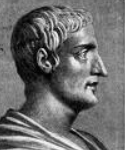Date of Birth
365
Place of Birth
Gaul, Roman Empire
Towns / Cities Moved Into
-
Known Occupation
Praestorian Prefect of Gaul
Consul of the West Roman Empire
Religion
-
Spouse
Magna Constantina de Roma
Death Information
Year of death
421
Place of death
Gaul, Roman Empire
Cause of death
-
Obituary

Parents

Flavius Eparchius Philagrius

Egnatia Avita Major Severa
Marital Status


Magna Constantina de Roma
Children




Narrative / Story
In the year 365, in the heart of the Roman Empire’s province of Gaul, a child was born into a world of political turmoil and cultural vibrancy. Named Agricola, he was the son of Flavius Eparchius Philagrius and Egnatia Avita Severa, a couple deeply entrenched in the aristocratic fabric of Roman society. Agricola’s early years were marked by the rich heritage of Gaul, a land where Roman and Gallic cultures intertwined.
As Agricola grew, he was shaped by the complexities of his time – an era where the Roman Empire was grappling with internal strife and external threats. His education, undoubtedly steeped in Roman literature, philosophy, and governance, prepared him for a life of public service. Agricola’s journey into public life began as he followed in his father’s footsteps, immersing himself in the administrative and political machinations of the Empire.
His career was a testament to his skill and dedication. Agricola ascended to the prestigious position of Praetorian Prefect of Gaul, a role that placed him at the heart of the province’s governance. His responsibilities were vast, overseeing the legal and administrative matters of Gaul, a region pivotal to the Empire’s stability. Agricola’s tenure as Prefect was marked by his efforts to maintain order and prosperity in a province often rocked by political and social upheavals.
In the midst of his illustrious career, Agricola’s personal life flourished. He married Magna Constantina de Roma, a woman of noble lineage, and together they had children – Eparchia Avita Maercilia Agricola de Narbonne, Flavius Marcus Maecilius Eparchius Avitus who later became the Roman Emperor of the West, Padusia Flavia Agricola de Rome, and Nymphidius Agricola. His family life was a tapestry of Roman aristocratic traditions, woven with the threads of duty, honor, and lineage.
Agricola’s life was not just defined by his administrative prowess but also by his role in the broader socio-political landscape of the Roman Empire. As Consul of the West Roman Empire, he was a key figure in an era marked by the shifting sands of power and the gradual decline of Roman authority in the West. His consulship, shared with Flavius Eustathius in the East, was a balancing act of diplomacy, governance, and military oversight.
The socio-economic challenges of his time were many. Agricola lived through a period where the Roman Empire was transitioning, facing pressures from barbarian invasions and internal fragmentation. The economic structures were strained, and the once-unified Roman world was splintering into regional entities. In Gaul, Agricola would have witnessed the interplay of Roman and Gallic cultures, a melting pot of traditions and identities.
Agricola’s life was also a reflection of the broader historical currents of his era. The Council of the Seven Provinces, an assembly in the praetorian prefecture of Gaul, was a significant element of his administrative landscape. This council, meeting annually in Arles, was a forum for the Gallo-Roman aristocracy, including bishops, to discuss and decide on matters of regional importance. Agricola’s role in this council would have been pivotal, given his position and influence.
In 421, Agricola’s journey came to an end in the land of his birth, Gaul. He passed away, leaving behind a legacy intertwined with the history of the late Roman Empire. His life, a tapestry of personal achievements, familial bonds, and public service, was emblematic of the complexities and richness of Roman provincial aristocracy.
Agricola’s story is not just a tale of an individual but a window into a pivotal era in history. It reflects the challenges and triumphs of a time when the Roman Empire was at a crossroads, grappling with internal divisions and external threats. His life, set against the backdrop of the fading glory of Rome, offers insights into the socio-economic and political dynamics of an empire in transition.
